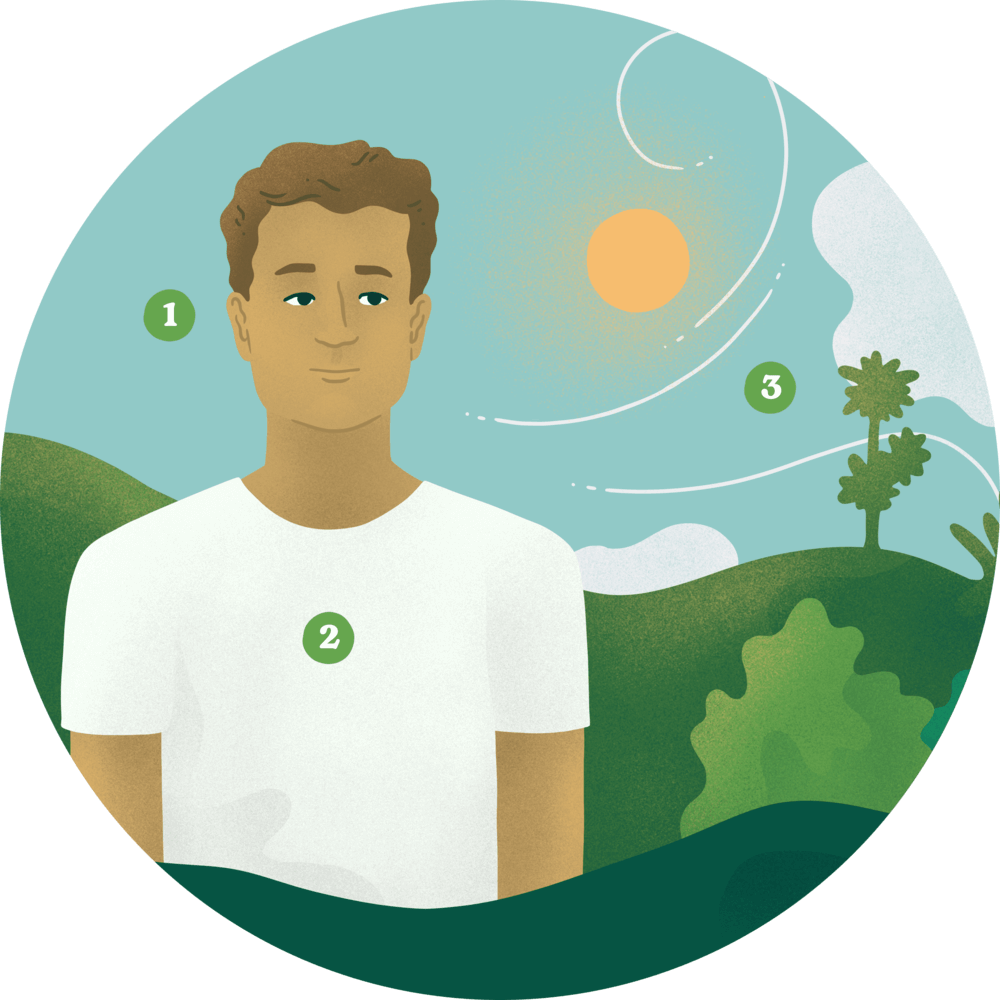
Identifying Signals
Some feelings in your body are useful signs to indicate that you’re becoming distressed. If picked up on quickly, they can signal that it is time to use a tool to improve your wellbeing. For example, if you notice your heart beating rapidly then you might try Deep Breathing or a meditation technique to calm down.

What are the signs that I’m starting to feel distressed?
Some feelings in your body are useful signs to indicate that you’re becoming distressed. If picked up quickly, they can signal that it is time to use a tool to improve your wellbeing. For example, if you notice your heart beating rapidly then you might try Deep Breathing or a meditation technique to calm down.
How does it help?
Through using this tool, you explore different areas of the body where you commonly feel physical sensations when starting to feel distressed. This helps you to become aware of when these body sensations are happening, so you can use the feelings as signs to either react appropriately, use a tool to improve your wellbeing, or simply engage in self-care. You’ll also be given some insights, which explain why the sensations occur.

FAQs
What is wellbeing?
Wellbeing is defined in different ways by different people. You might see it as your life force, overall level of holistic health, or how comfortable, healthy and happy you currently are. Wellbeing exists on a continuum from low to high which we can move up and down.
Why do I only choose 1-3 signals?
Good question. Our mind and body are interconnected, so when we feel emotions we also experience physical sensations. For example, “butterflies in your stomach” when you’re nervous or tense muscles when you’re stressed.
It’s more effective to become aware of a few of the most noticeable signs you experience. Rather than trying to look out for all of these signs, we’d encourage you to calmly notice 1-3 signs.
This is because, with practice, you will become more aware, meaning you can spot your signs even when they aren’t that obvious and you’re busy with other things. The earlier you spot them and use a tool, the less likely that distress or feeling overwhelmed will take over. Eventually, you will notice signs and do something about how you’re feeling without even having to think about it.
How is wellbeing affected?
Your everyday level of wellbeing goes up and down based on things that are happening. This can be due to what you are doing, what you’re thinking, your physical health, how things are going with your relationships and your sense of purpose and meaning in life.
Learning to recognise the signs that your wellbeing is changing, especially if it’s lowering, is important as these signal that there is something to attend to in order to reinvigorate your wellbeing.

Try Identifying Signals now
Small Steps Toolbox
These tools have been developed to help with feelings of anxiety, stress, or low mood. Each tool only takes a few minutes. Health and wellbeing is an ongoing journey - so try them out and see what works for you.
Balancing Mood
This tool can give you insight into how what you’re doing affects your mood, and recommends activities that can improve how you’re feeling.
Understanding Loneliness
Loneliness is a common feeling we all get from time to time. The tool asks you when you feel lonely and gives insights on why or what you can do about it.
Mindful Watching
During this mindfulness exercise, you’ll be guided by relaxing audio to calmly notice different visual aspects of images and apply this to your surroundings.
Reframing Thoughts
This tool can help to identify unhelpful patterns in your thoughts and beliefs and reframe them over time to help you feel better and make decisions that support your overall sense of wellbeing.
Improving Sleep
Improving Sleep is a quiz that helps you explore the things you can do or avoid that can lead to a better quality sleep. There are a variety of tips available so you can choose something that suits your lifestyle.
Supporting Others
Supporting Others gives you tips on what you can say or do when you’re helping someone who’s going through a hard time.
Gratitude Practice
Learn to appreciate the small things in life through practising gratitude. Doing this regularly can help lift your mood and make you feel happier.
Muscle Relaxation
Teach your body how to relax better through muscle relaxation. The key is learning to apply this skill in everyday life to the entire body so that you’re not tensing muscles when you don’t need to.
Deep Breathing
This reflective technique involves slowly breathing in and out to help you feel calmer and more relaxed. This tool is guided by an animated image that inflates and deflates.
Active Listening
This skill involves fully focusing on what a person is saying, rather than selectively hearing. In this exercise, you’ll practice listening and develop an awareness of when you’re not paying attention.
Building Self-Worth
This tool helps you on your journey to gain self-worth. Go through the Building Self-Worth card deck for energetic, reflective, or inspirational activities.
